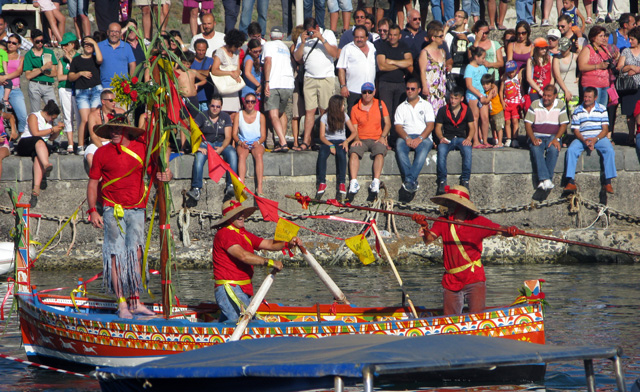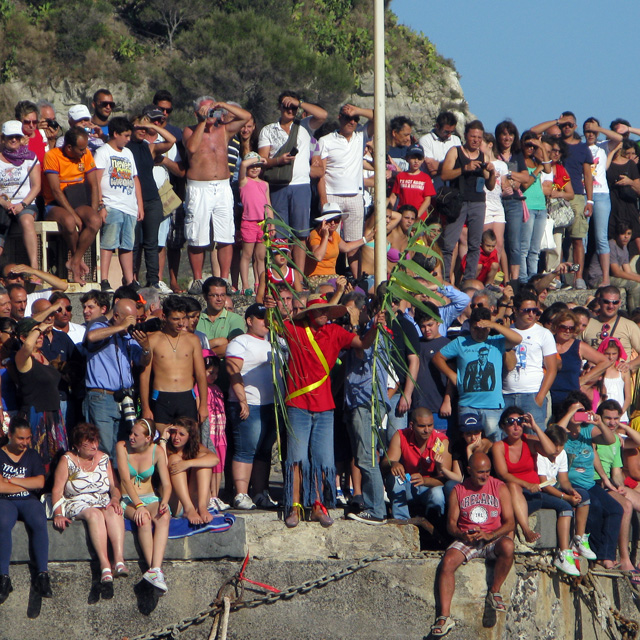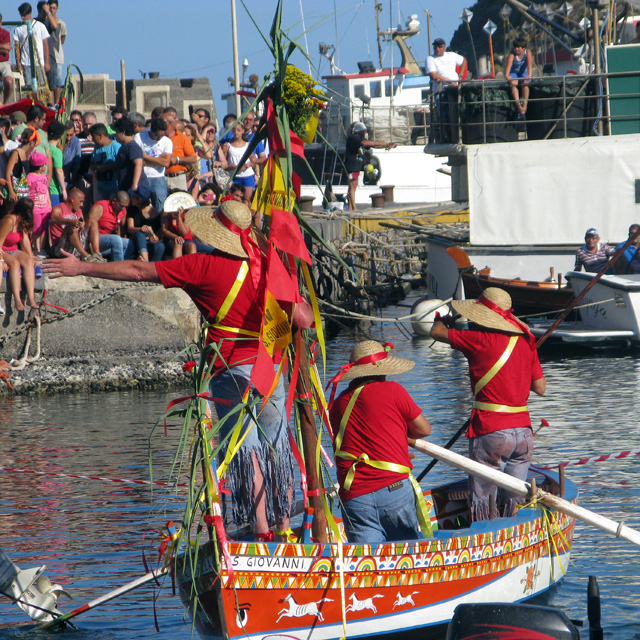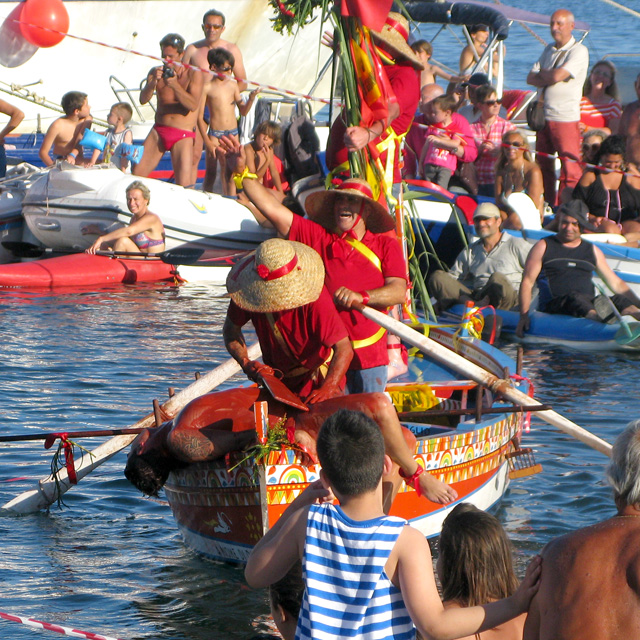 The town of Acitrezza is decked in red and yellow ribbons. They flutter from balconies as old men perch on the steps of the church of the saint that the ribbons are celebrating: San Giovanni Battista. Even at this time, just before 5pm, the sun beats down hot on the tops of my feet where they stretch out past the cafe table. I put one foot on top of the other alternately to give them some respite as I watch the steady stream of people heading along the street towards the church.
The town of Acitrezza is decked in red and yellow ribbons. They flutter from balconies as old men perch on the steps of the church of the saint that the ribbons are celebrating: San Giovanni Battista. Even at this time, just before 5pm, the sun beats down hot on the tops of my feet where they stretch out past the cafe table. I put one foot on top of the other alternately to give them some respite as I watch the steady stream of people heading along the street towards the church.
It’s 24 June, and I’m in Acitrezza to see ‘u pisci a mari’ which, if my shaky understanding of Sicilian dialect is holding up, translates to something like ‘the fish in the sea’. The rest of the day, and indeed much of this month, is dedicated to the town’s patron saint, San Giovanni Battista. When these seafolk aren’t celebrating their saint, however, they celebrate fish: hence ‘u pisci a mari’. I’m told it’s a pantomime. In a boat. I’m not sure what to expect, but it sounds entertaining.
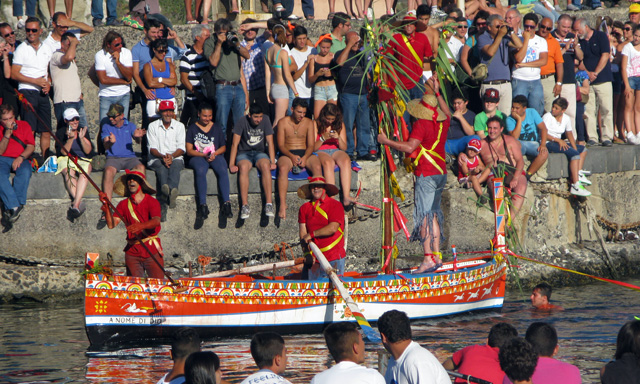 I’ve settled myself in the chic, white-fronted bar close to the church, with what should be a prime view for when the procession prefacing the main show appears. I lean back in my chair and chill out to the lazy acid jazz that’s playing in the bar. It’s a bit of a contrast to the comic parps of brass instruments which drift at intervals along the street: I giggle quietly to myself.
I’ve settled myself in the chic, white-fronted bar close to the church, with what should be a prime view for when the procession prefacing the main show appears. I lean back in my chair and chill out to the lazy acid jazz that’s playing in the bar. It’s a bit of a contrast to the comic parps of brass instruments which drift at intervals along the street: I giggle quietly to myself.
The obligatory group of men is gathered in the corner of the piazza, guffawing at jokes that only they can hear. They’re younger than the usual – in their 40s rather than their 60s – so instead of sitting on the row of benches with their prime view of the sea they’re leaning on the railings. Their clothes are more casual than the older generation’s, too, being shorts and flipflops rather than trousers and button-down shirts. Their group dynamic is the same, though: old friends, hangin’ out and shootin’ the breeze together, just the same as they have done all their lives.
The hum of voices gets louder, as does the goose-like honk of a trombone. I can *hear* the procession; I just can’t *see* it. I decide to pay up and take a wander to see if I can find it. Just in time, apparently – in classic pantomime tradition, while I’ve been looking south along Via Provinciale the procession has appeared from the north. It’s be-HIND you …
The performers reach the church just as I walk out of the bar and realise my gaffe. They charge up onto the church steps, accompanied by a crush of grinning audience. I see flashes of red and yellow, along with waving palm fronds and floppy straw hats. Somewhere close to me a trombone slides and a trumpet parps; in response the performers caper about on the church steps, brandishing their palm fronds above their heads as they dance and cheer. A buzz of excitement grows throughout the crowd, winding to fever pitch until the men leap down from the steps and race towards the slipway in the harbour below. The crowd splits like oil around vinegar, melting back together as the performers pass through, and flooding down to the harbour after them.
At the harbour there are already crowds lining the walls. We who have either followed the procession or missed it entirely because we were looking the wrong way (*ahem*) are left on the slipway, watching the performers as three of them scramble into a traditional painted boat. Two others split off and rush through the crowds to their posts on the harbour walls. These two are ‘i rais di terra’ – the on-the-ground lookouts. It’s their job to keep an eye out for the fish and to shout to ‘la fiocina’ – the harpoonist – when they see him. La fiocina, meanwhile, sits at the very front of the boat, brandishing a trident and a machete with a grin that splits his face from ear to ear. He’s smaller and wirier than the other two in the boat. They circle the tiny harbour as he stabs his trident into the water with cheery relish, hunting for fish.
The man in the middle of the boat is known as ‘il rematore’ – the oarsman. His rotund appearance belies his strength: for the next hour or so he rows the wooden boat, complete with passengers, round and round the harbour single-handedly with a happy grin and without even seeming to break a sweat.
At the back of the boat there stands a tall man with a barrel chest and a joyful, dog-like expression of glee on his face who – if this were an English pantomime – would be the Dame character. In this show, he is ‘il rais di bordo’ and his job is to look out for the fish from the boat. Like the rest of the performers, he’s dressed in red and yellow, and now that they’re out on the water I get the chance to take them in properly. They all wear floppy straw hats, of the kind that my grandmother used to wear when gardening, tied under their chins with red ribbons. Yellow ribbons criss-cross their chests, tied as sashes over the top of red shirts, and they all have red neckerchiefs edged with yellow around their shoulders. Underneath, they wear blue jeans tattered to the knees, giving them a comical ragamuffin appearance. As the show will prove, these aren’t meant to be the most successful of fishermen …
The edge of the harbour is lined with boats, all of which are teeming with people – mainly young men – who are brown as berries from the sea and the sun, and (un)dressed for a swim. Somewhere in among this motley crew is ‘il pesce’ – the fish – but at this point in time it’s not clear where: the boat people’s job is to hide him until he chooses to sneak out into open water. It’s not long before he does so: there’s a shout from ‘i rais’ and a cheer from the crowd. The fishermen in the boat throw their arms up into the air with whoops of glee – the chase is on!
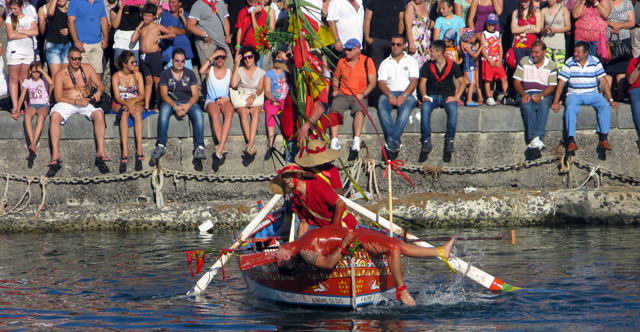 I don’t see it happen through the crowds of people, but suddenly the fish – actually a man in red speedoes with red and yellow ribbons tied around each of his wrists and ankles – is on his back, up on the prow of the boat, and la fiocina is brandishing a large wooden machete. The band starts to play – among other classics I recognise strains of Lou Monte’s Lazy Mary – and the fish wriggles, kicking his legs and waving his arms like a stranded beetle as the machete comes down on him, again and again. There’s fake blood everywhere: it would be macabre were everyone not having such obviously good fun. Time and again, as the boat goes round and round in circles, and to roars of appreciative laughter and suggestive slides and parps from the trombone, la fiocina pretends to cut off the prominent bulge in the fish’s speedoes, all the while smearing on more and more fake blood.
I don’t see it happen through the crowds of people, but suddenly the fish – actually a man in red speedoes with red and yellow ribbons tied around each of his wrists and ankles – is on his back, up on the prow of the boat, and la fiocina is brandishing a large wooden machete. The band starts to play – among other classics I recognise strains of Lou Monte’s Lazy Mary – and the fish wriggles, kicking his legs and waving his arms like a stranded beetle as the machete comes down on him, again and again. There’s fake blood everywhere: it would be macabre were everyone not having such obviously good fun. Time and again, as the boat goes round and round in circles, and to roars of appreciative laughter and suggestive slides and parps from the trombone, la fiocina pretends to cut off the prominent bulge in the fish’s speedoes, all the while smearing on more and more fake blood.
It’s beginning to look like it could be all over for the fish – but no! in a slick, slippery move, he slides, backwards and headfirst, into the sea while la fiocina’s machete is poised aloft for a second too long. The crowd goes wild, as do the two ‘rais’ on the harbour walls, who fling themselves into the water in comic abject misery at the loss of their catch. By the time they’ve hauled themselves back up to their posts, though, the chase is back on again with renewed vigour.
This time around, buckets of water have appeared on some of the boats, and grinning, bronzed boys in indecently small speedoes fling them over the fishermen as they pass. The rais a bordo gives a whoop of laughter and scoops a cheer from the crowd with the arm which isn’t clutching his lookout post. His grin gets ever larger even as his soggy straw hat flops around his ears and his ribbon ties droop; there’s no keeping a good Dame down, even if he is soaking wet.
A yell from the crowd and mad music from the other harbour wall signals the second capture of the fish. He flails on the front of the boat, now covered in blood from armpits to knees, as the crowd dance and cheer, and the fishermen grin fit to burst. But what’s this?! He’s escaped again! The fishermen rock their boat so wildly that it seems sure to capsize, but they manage to save themselves, and start their hunt again.
“Just wait until the fish gets away!” chuckles the man next to me. “Then there will be a surprise!” The crowd waits with bated breath – a good 90% of them are probably locals who see this every year, so they know what’s coming. The third time that the fish slides into the water, covered in blood but still swimming, the fishermen are so comically enraged that they really do capsize their boat. Into the water they go! The boys from the boats around the harbour have all been waiting for this moment and with whoops of glee they launch themselves into the sea, too, to help right the boat. The water is red with blood and a real fish, caught earlier and planted in the bottom of the boat, bobs to the surface. The fishermen may have lost their man, but after such an entertaining show it’s good to know that they’ve still got their fish.

